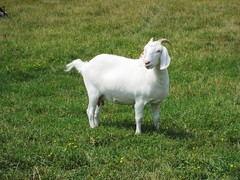Dairy goats of mixed aged groups were grazed on one of two poor quality mixed pastures between March and July 2006 at the Heifer Ranch in Perryville, Arkansas. They were supplemented with grass hay and concentrate according to their level of milk production.
 Half the goats (n=12) were administered the herbal dewormer according to the manufacturer's instructions. The other half (n=12) were not treated. Fecal egg counts and FAMACHA eye anemia scores (1-5) were determined every 14 days for 112 days.
Half the goats (n=12) were administered the herbal dewormer according to the manufacturer's instructions. The other half (n=12) were not treated. Fecal egg counts and FAMACHA eye anemia scores (1-5) were determined every 14 days for 112 days.FAMACHA scores were greater (more anemic) for the herbal-treated goats and increased after March for both groups. Any goat that scored 5 on the FAMACHA scale was dewormed with moxidectin. High FAMACHA scores are indicative of barber pole worm infection. The barber pole worm (Haemonchus contortus) is the primary worm parasite affecting sheep and goats in warm, moist climates.
Fecal egg counts were greater for herbal-treated goats in one of the pastures by day 42, but otherwise did not vary among groups. A high fecal egg count indicates a high level of infection with stomach worms. In this study, the herbal dewormer failed to control gastro-intestinal parasites in dairy goats.
Source: Abstracts, American Society of Animal Science, Southern Section, February 2-5, 2008. Read abstract on page 34 of the PDF document.
